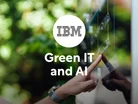IBM: How Are Organisations Using Sustainable Computing?

In the relentlessly advancing digital world, robust IT frameworks are indispensable. Beyond function, IT is pivotal in steering sustainability efforts, turning data into actionable insights to mitigate environmental impacts.
The magic lies in Artificial intelligence (AI), revolutionising energy and operational efficiency.
According to IBM, data is the ‘lifeblood’ of sustainability efforts, with AI fast-tracking the transformation of raw data into pivotal insights.
A global survey by the IBM Institute for Business Value sheds light on the role of computing practices in sustainable corporate strategies, gathering insights from more than 1,100 executives.
Kareem Yusuf, Ph.D., Senior Vice President, Product Management & Growth at IBM Software, says: “It is crystal clear that sustainability challenges are also business challenges.
"Companies that want to thrive in today’s competitive landscape need a deep understanding of their waste, energy costs, environmental risks and supply chains.”
Generative AI: A game-changer in in sustainable operations
IBM's report reveals that on average, IT operations account for a fifth of energy expenses in surveyed organisations. The adoption of generative AI and green IT is predicted to rise by 230% by 2027, earmarking energy consumption optimisation as a priority.
In 2023, 27% of surveyed organisations were already harnessing generative AI in their sustainable IT efforts, with projections suggesting a surge to 89% before 2028.
Around half have fully embraced AI for sustainable design, witnessing its substantially positive impact on IT operations' sustainability.
However, sustainability assessments remain underutilised in IT project planning, a practice adopted to a "very great extent" by merely 23% of the organisations. The strategic implementation of generative AI, as per IBM, is quintessential for achieving meaningful IT sustainability.
Enterprises adopting a holistic approach to IT sustainability are reporting double the reduction in their IT carbon footprint and notable cost savings compared to their peers, underscoring the operational efficiencies gained through comprehensive sustainability strategies.
Leveraging hybrid cloud for sustainable IT
Hybrid cloud, a blend of public cloud and on-premises data centres, emerges as a versatile solution fostering both flexibility and cost efficiency.
This allows for flexibility and cost reductions.
Speaking in August, Christina Shim, Chief Sustainability Officer at IBM, says: “IBM serves as client zero for many of the technologies it brings to market, leveraging our own solutions and innovations to make a lasting, positive impact through sustainability and in our business.
“From minimising climate-related risks to creating and implementing industry solutions that harness the power of Artificial Intelligence (AI) and hybrid cloud, we will create more pathways to better conserve natural resources and reduce environmental impact."
Utilising hybrid cloud technology enhances sustainability and energy efficiency, with significant positive impacts on IT sustainability reported by nearly half of the adopters.
Furthermore, automation stands out as a key practice for those embracing an all-encompassing approach to IT sustainability, optimising environments based on demand.
******
Receive the next edition of ClimateTech Magazine by signing up for its newsletter.
As part of this portfolio, make sure you check out Sustainability Magazine and also sign up to our global conference series - Sustainability LIVE.
Also check out our Sister Brand, Energy Digital.
*****

